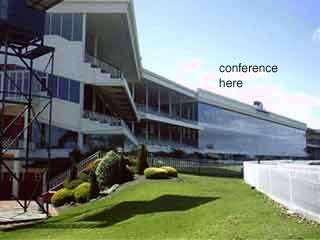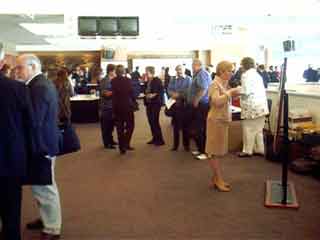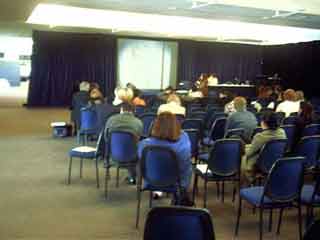
Conference
Report
 |
AVETRA
2002 Conference Report |
|
This year's AVETRA conference was held in an unlikely venue - Caulfield racecourse - but the views from the glassed in conference area provided an ideal space for reflection and networking, and generated a number of handy race day phrases like 'we're off', 'please proceed to the starting gates', etc. The sub-themes for the conference were Innovation, Internationalisation, and New Technologies and VET. My main interest was in the new technologies sessions, and my comments here are limited to those with a focus on these new technologies. |
 |
| In the opening panel session Rodney Spark (DEET, Victoria) suggested that the Internet be heritage listed before it changes forever. The Internet as a source of free and uncensored universal information is fast becoming a thing of the past. Rodney trotted out some humorous predictions from years gone by about how the Internet would affect civilization (e.g. each hour on the Net means a reduction in 2.7 social contacts, and an increase of 0.4 on a loneliness scale!) and suggested that these predictions of gloom paralleled societies fear of rock 'n roll in the 50's. (Actually I had a suspicion that many delegates wanted this data to be true. Technology was not the main focus of the conference and it was interesting to observe that for many technology is still a curse they have to bear. There is still an element of hostile resistance from the non-converted. This was a touch ironic considering that one of the sub-themes of the conference *was* technology.) |  |
| Chris Ziguras (RMIT), speaking on the Internationalisation of VET, asserted that Asian students don't want Net based courses. Cathy Down, reporting on the Victorian based Triple C project, Creating Virtual Learning Communities, said that "we're stuck in our colleges answering all these emails. She suggested further that the use of IT is supposed to overcome the tyranny of distance, but IT itself has become the tyrant. (I have some sympathy with that view.) She added that those communities in the Triple C project that met face to face tended to work better than those that were exclusively virtual. | |
 |
|
 |
|
|
The most important session for me was one by John Mitchell reporting on recent research locally, and observations from the international arena.
Kaye Schofield reported on eLearning in the Corporate Context, and began by echoing a point I first heard Dale Spender make late last year. The nature of learning with new technologies is changing so fast that it was necessary to shift the focus of the research during the life of Kaye's project from online learning to elearning. Backing up John Mitchell's claims above, she said the corporate world knows 'who's who in the (education) zoo', but we in education have no idea who's who in the (corporate) zoo'. Kaye examined the elearning practices of four major companies. Some observations:
|
|
|
Perhaps the most enjoyable and enlightening event of the whole conference was the hilarious summary by Peter Kirby (ex SA Director General of Education). With a straight face and a deadpan northern English accent he proceeded to irreverently mock every session he'd attended (mine included), but managed to do so graciously while making a point of substance about each presentation. So if I'm ever presenting at a conference again and I see this older unassuming grey haired gentleman in the audience I will steel myself for the good natured ridicule that will be part of his conference summary. The man's a gem and sent us all home laughing. Michael Coghlan |
That's all folks! |